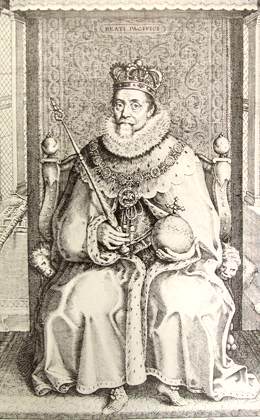A changing political climate
James I was essentially a good king with noble ambitions; he hoped to unify England and Scotland (as Great Britain) and to arbitrate religious harmony in Europe. But James had obvious personal weaknesses, and his performance fell far short of his aims. His rule was accompanied by deepening pessimism and cynicism*.
James lacked Elizabeth's finesse in governing, was dangerously neglectful of public opinion, and failed to realize the limitations placed on the Crown by weak finances and the need to cooperate with Parliament*.
He also blundered by alienating* both the middle class and the nobles, and he enjoyed idleness too much for a monarch whose realm was strained by potentially explosive religious and political tensions.
"A body without a head"
Parliament's lengthy unproductive debates and lack of support for royal policies was largely a result of the King's weak leadership. Elizabeth had controlled Parliament effectively through her Privy councillors--strong-willed and intelligent ministers who usually dominated debates in Parliament.
But James inherited a Privy Council that had degenerated into the single-faction rule of Robert Cecil; although Cecil was a competent minister, the Council was weakened by his domination and after his death (1612) split into factions of inept courtiers*. The King's good relations with Parliament were not helped by his pedantic lectures on the divine right of kingship and royal prerogative*. It was this tactless blundering* which led the King of France to describe James as "the wisest fool in Christendom."
Footnotes
-
Cynicism and tragedy
The flowering of great Jacobean tragedies, Shakespeare's among them, is one sign of a widespread loss of the optimism that had characterized Elizabeth's reign. In all fairness, it should be said that the process had started late in her reign, with inflation, and the plague contributing.
-
Parliamentary muscle
James's mishandling of Parliament contributed to the failure of financial reforms proposed by Cecil in 1610; his exalted view of monarchy and use of unpopular methods to raise money (by-passing Parliament) awakened fears of arbitrary rule among the governing classes. It was thus in James's reign that a reaction began against royal prerogative, shown by Parliament's novel claim in 1621 of a voice in foreign policy. Parliament also flexed its muscles in 1621 with the impeachment of Lord Chancellor Francis Bacon for taking bribes. The unassailable dignity and authority of the monarchy was on the decline.
-
James's blunders
James sold business monopolies on a greater scale, increased customs fees, and put a price on honour by selling aristocratic titles. The first two expedients antagonized merchants, while the latter was repugnant to the proud upper classes.
-
Too many cooks
The efficiency of the Council was also impaired by a Parkinsonian growth in size, increasing from a tight body of twelve ministers to an unwieldy thirty-five by 1620.
(Parkinson's Law states--somewhat cynically--that the staff of an organization expands even while its productivity and efficiency declines. Or, in other words, any given amount of work will find a way to use up all available resources.)
-
Not exactly machiavellian
Though James never meant to threaten the traditional rights of Parliament, such speeches naturally put England's entire governing class (the gentry) on the defensive, and helped the Puritans regain support in Parliament, as they were the most outspoken opposition to the King's Catholic leanings.
(James caused particular worry to Protestants by his sympathy towards Arminianism, a belief that challenged the Calvinist doctrine of predestination by arguing the existence of free will, also a principle of Catholic teachings.)
-
The Spanish again
He was even influenced by the Spanish Ambassador to execute the popular Sir Walter Raleigh, who had run into conflict with Spaniards in South America while gold-hunting.
